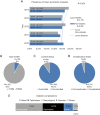Preoperative diabetes complicates postsurgical recovery but does not amplify readmission risk following pancreatic surgery
- PMID: 35531107
- PMCID: PMC9068538
- DOI: 10.21037/gs-21-648
Preoperative diabetes complicates postsurgical recovery but does not amplify readmission risk following pancreatic surgery
Abstract
Background: Diabetes is a significant and prevalent medical condition associated with increased comorbidities, longer hospital length of stay, and higher healthcare costs. We aimed to assess the association between diabetes mellitus and postoperative outcomes following pancreatic surgeries.
Methods: Records for patients with major elective pancreatic surgeries were retrieved retrospectively from the Nationwide Readmission Database (2010-2014). Association of diabetic status with postoperative complications, in-hospital mortality, length of stay (LOS), readmission rate, and hospital costs were investigated. Logistic regression and decision tree analyses were employed to predict adverse outcomes.
Results: A total of 8,401 patients who had pancreatic surgery were included. They were categorized according to their diabetic diagnosis. Results showed that diabetic patients had a higher risk of postoperative complications compared to non-diabetics (OR: 1.27, 95% CI: 1.08-1.49, P=0.003). Bleeding and renal complications were the most significant. Uncontrolled diabetes significantly required a longer hospital stay (9.17±4.28 vs. 8.03±4.96 days, P=0.001), and incurred higher hospital costs ($34,171.04±$20,846.61 vs. $28,182.21±$24,070.27, P=0.001). After multivariate regression, no association was found with in-hospital mortality or readmission rates; however, diabetic patients' length of stay during readmission was increased at 30- and 90-day readmissions (P=0.004 and 0.007, respectively).
Conclusions: Among patients who underwent pancreatic surgery, those with diabetes had a higher rate of postoperative complications compared to non-diabetics. Additionally, diabetic patients had higher hospital charges and costs during primary admission. Initial analysis of patients with diabetes showed they had higher rates of 30- and 90-day readmissions, though this did not maintain significance after regression analysis. Exploring the mechanisms underlying this finding would aid in preventing postoperative complications and reducing healthcare costs.
Keywords: Pancreatectomy; cost; mortality; national database; readmission.
2022 Gland Surgery. All rights reserved.
Conflict of interest statement
Conflicts of Interest: All authors have completed the ICMJE uniform disclosure form (available at https://gs.amegroups.com/article/view/10.21037/gs-21-648/coif). Emad Kandil serves as an Editor-in-Chief of Gland Surgery. The other authors have no conflicts of interest to declare.
Figures






Similar articles
-
Analysis of Hospital Readmissions After Prosthetic Urologic Surgery in the United States: Nationally Representative Estimates of Causes, Costs, and Predictive Factors.J Sex Med. 2017 Aug;14(8):1059-1065. doi: 10.1016/j.jsxm.2017.06.003. Epub 2017 Jul 12. J Sex Med. 2017. PMID: 28709874
-
Comparison of 30-day readmission rates and risk factors between carotid artery stenting and endarterectomy.J Vasc Surg. 2017 Nov;66(5):1432-1444.e7. doi: 10.1016/j.jvs.2017.05.097. Epub 2017 Aug 31. J Vasc Surg. 2017. PMID: 28865979
-
Modified-frailty index does not independently predict complications, hospital length of stay or 30-day readmission rates following posterior lumbar decompression and fusion for spondylolisthesis.Spine J. 2021 Nov;21(11):1812-1821. doi: 10.1016/j.spinee.2021.05.011. Epub 2021 May 16. Spine J. 2021. PMID: 34010683
-
Nationally Representative Readmission Factors in Patients with Claudication and Critical Limb Ischemia.Ann Vasc Surg. 2018 Oct;52:96-107. doi: 10.1016/j.avsg.2018.03.011. Epub 2018 May 17. Ann Vasc Surg. 2018. PMID: 29777842
-
Temporal Trends and Predictors of Thirty-Day Readmissions and Emergency Department Visits Following Total Knee Arthroplasty in Ontario Between 2003 and 2016.J Arthroplasty. 2020 Feb;35(2):364-370. doi: 10.1016/j.arth.2019.09.015. Epub 2019 Sep 14. J Arthroplasty. 2020. PMID: 31732370 Review.
Cited by
-
Impact of Preoperative Diabetes Mellitus on Postoperative Outcomes in Elective Pancreatic Surgery and Its Implications for Prehabilitation Practice.Pancreas. 2024 Mar 1;53(3):e274-e279. doi: 10.1097/MPA.0000000000002300. Epub 2024 Jan 26. Pancreas. 2024. PMID: 38277400 Free PMC article.
-
Preoperative risk factors for extended hospital stay: A prospective study in a South African clinic.Afr J Prim Health Care Fam Med. 2025 Mar 20;17(1):e1-e10. doi: 10.4102/phcfm.v17i1.4781. Afr J Prim Health Care Fam Med. 2025. PMID: 40171694 Free PMC article.
References
-
- Roglic G. WHO Global report on diabetes: A summary. International Journal of Noncommunicable Diseases 2016;1:3. 10.4103/2468-8827.184853 - DOI
-
- World Health O. Global report on diabetes. Geneva: World Health Organization, 2016.
LinkOut - more resources
Full Text Sources
